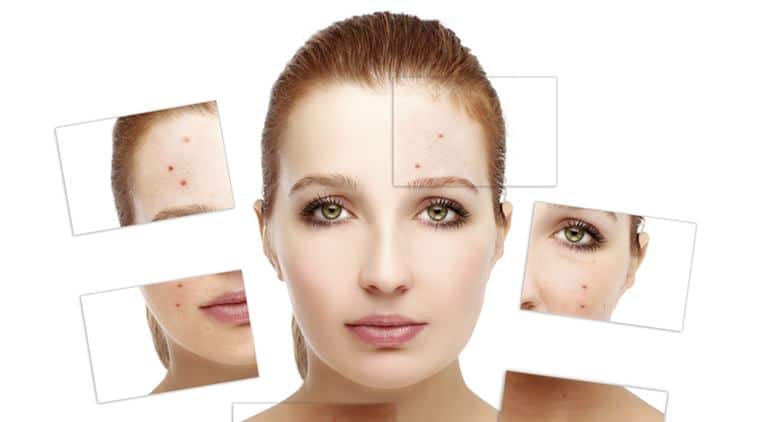
ECZEMA
Eczema and Dermatitis are synonymous. They can refer to distinctive reaction pattern in the skin, which
can be either acute or chronic and are due to a number of causes.
Condition is transient (comes and goes)
Commonly in infants and children
Environmental factors aggravate it
Characterized by red, inflamed skin
In Acute Stage, edema of the epidermis (spongiosis) progresses to the formation of intra epidermal
vesicles, which may be enlarged and rupture.
Symptoms in Acute Stage
-
- ● Redness and swelling, usually with ill defined margins
-
- ● Papules, vesicles and more rarely, large blisters
-
- ● Exudation and cracking
- ● Scaling
In Chronic Stage there is less edema and vesiculation but more thickening of the epidermis (acanthosis);
this is accompanied by a variable degree of vasodilation and Tcell lymphocytic Infiltration in the upper
dermis.
Symptoms in Chronic Stage
-
- ● May show all of the above features, although it is usually less vesicular and exudative
-
- ● Lichenification, a dry leathery thickening with increased skin marking, is a secondary to rubbing
-
- and scratching
-
- ● Fissures and scratch marks
- ● pigmentation changes (hypo or hyper)
AFFECTED PARTS
- ✔
- Usually forms on back of knees, hands, cheeks, chin or inside of elbows tends to be very itchy
- ✔
- Commonly causes moisture, skin oozing, crusty sores, thick skin, and cystic or pimples-like
-
- eruptions appears at a younger age like infancy or childhood
- ✔
- More likely to flare up in response to external factors like sunburns or reactions to skin or
- cleaning products
Eczema Factors
Chemical irritants: This would include soaps, lotions and shampoos with harsh chemicals. It can also
include reactions to pharmaceutical medications
Environmental Allergens: This includes dust mites, pets, pollen, weeds and mold sensitivities
Very Hot and Very Cold Temperature: Extreme temperature changes stress the skin and this includes
hanges in humidity
Mental and Emotional Stress: Chronic stress ramps up inflammation in the body
Food Sensitivities: Food sensitivities and leaky gut syndrome trigger inflammation that can impact the
skin
Hormone Changes: Some women notice an increase around their menstrual cycle when they see larger
shifts in hormonal levels
Microbial over Growth: An overgrowth of gut microbes puts a stress load on the body that triggers
inflammation
SEVERAL PATTERNS OF ECZEMA
-
- ● ATOPIC
-
- ● SEBORRHOEIC
-
- ● DISCOID
-
- ● IRRITANT
-
- ● ALLERGIC
-
- ● ASTEATOTIC
-
- ● GRAVITATIONAL
-
- ● LICHEN SIMPLEX
- ● POMPHOLYX
SIGNS AND SYMPTOMS
Itching and Burning: The skin area becomes more inflamed (swollen, hot and red) and the person with
infected eczema feels extreme itching and burning
Blisters and Boils: The eczematous lesions get blisters, boils and cysts with red r yellow color spots with
pus that drains when full
Feeling Exhausted: The skin becomes very painful “like you have cuts all over the body”. The person
feels very tired and unwell which drains the body
Spreads Quickly: In case of a staph infection, eczema spreads more quickly where the skin appears
raised like boils and makes healing more difficult
Fever and Chills: In more advanced cases, a person may experience more severe symptoms including
fever, chills, aches and fatigue
ATOPIC ECZEMA
ATOPY is a genetic predisposition to form excessive IGE, which leads to a generalized and prolonged
Hypersensitivity to common environmental antigen, including pollen and the house dust mite.
DIAGNOSTIC CRITERIA FOR ATOPIC ECZEMA
-
- Itchy skin and at least 3 of the following
-
- ● History of itch in the skin creases (of cheeks if <4 years)
-
- ● History of asthma /hay fever (or in a first degree relatives if <4 years)
-
- ● Dry skin (xeroderma)
-
- ● Visible flexural eczema (cheeks, forehead, outer limbs if <4 years)
- ● Onset in the first 2 years of life
EARLY PREVENTION OF ATOPIC ECZEMA
-
- ● Restrictions in maternal diet during pregnancy have no effects on the incidence of atopic
-
- eczema
-
- ● In an infant at hereditary risk and may adversely affect the maternal and /or fetal nutrition.
- ● Breast feeding, however, appears to reduce the prevalence of atopic eczema in early childhood.

 Whatsapp
Whatsapp 7337067700
7337067700 support@starhomeopathy.com
support@starhomeopathy.com



